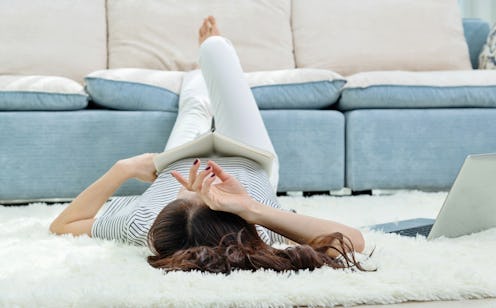Life
All The Sleep Benefits You Get From Doing Dry January

People do Dry January for a host of reasons: giving their wallets a break, reducing hangovers after a heady holiday season, or even just feeling sober-curious. If you're considering trying Dry January, you may experience benefits in an unexpected area: sleep. According to experts, drinking alcohol before bed can substantially change your sleep patterns, messing with the amount of deep sleep you get, how long it takes to fall asleep, and how refreshed you feel when you wake up. A month of sobriety, whether it's in January or at any other point in the year, can reverse these changes, and give you more restorative, natural sleep.
To understand how sobriety can affect sleep, you need to know how alcohol affects sleep patterns. It turns out that even a small amount of alcohol before bed has an impact. "Even two or three drinks can change sleep topography," Dr. George Koob Ph.D., the director of the National Institute on Alcohol Abuse & Alcoholism, tells Bustle. A review of science on sleep and alcohol published in Alcoholism: Clinical & Experimental Research in 2013 noted that alcohol affects sleep in multiple ways. One is sleep onset latency, or how long it takes to get to sleep. "Alcohol will make you go to sleep faster," Koob tells Bustle. "It’s not a big effect, but it does alter your sleep onset."
Once you're asleep, though, alcohol starts disrupting your sleep patterns. Koob tells Bustle that depending on how much you've drunk, you'll likely see a rise in deep sleep in the first half of the night, and then a reduction in rapid eye-movement (REM) sleep in the second half. The increase in deep sleep might sound good for you, but it isn't, Dr. Michael Breus Ph.D., a clinical psychologist, tells Bustle; the balance of deep sleep and REM in your nightly cycle is precisely calibrated. When deep sleep and REM are unbalanced, you end up getting fewer of the benefits of REM sleep — which include memory boosts — and feeling more tired when you wake up.
Sleep after drinking can also be unsatisfying because of increased wakefulness in the night. Research published in Alcohol in 2014 found that alcohol can alter the body's homeostasis, which affects, among other things, when we feel sleepy or wakeful. When you've been drinking, your body gets confused and starts waking you up in the night, making the next morning very bleary indeed. Breus tells Bustle that many people may not even realize they've woken up, because these "micro-awakenings" are so brief — but they're still enough to disrupt your sleep.
The good news is that a month of sobriety is capable of restoring your normal pattern of sleep. "If you stop drinking, you’ll go back to your normal sleep architecture, which is an alternation of slow-wave sleep with REM sleep," Koob tells Bustle. Not drinking for a month can also reduce the other side effects of alcohol before sleep, Breus says, including snoring and insomnia. This is particularly important for women; for reasons that we don't fully understand, Breus tells Bustle, women appear to be more affected by sleep disruption after drinking alcohol than men are.
However, if you have signs of alcohol dependence disorder, a month won't be enough to restore your sleep patterns. A study published in 2009 in Sleep found that people with alcohol dependence disorder still experience problems with their sleep many months after they first become sober. If you're concerned that you may exhibit symptoms of alcohol dependence disorder and would like to get help, talk to your doctor, therapist or a treatment professional.
Dry January can be an excellent break for your wallet, your gut and your social life — and science shows that it can definitely help your sleep. Be prepared to enter the new year with a better-rested glow.
If you or someone you know is seeking help for substance use, call the SAMHSA National Helpline at 1-800-662-HELP(4357).
Studies cited:
Colrain, I. M., Nicholas, C. L., & Baker, F. C. (2014). Alcohol and the sleeping brain. Handbook of Clinical Neurology, 125, 415–431. doi:10.1016/B978-0-444-62619-6.00024-0
Colrain, I. M., Turlington, S., & Baker, F. C. (2009). Impact of alcoholism on sleep architecture and EEG power spectra in men and women. Sleep, 32(10), 1341–1352. doi:10.1093/sleep/32.10.1341
Ebrahim, I. O., Shapiro, C. M., Williams, A. J., & Fenwick, P. B. (2013). Alcohol and Sleep I: Effects on Normal Sleep. Alcoholism: Clinical and Experimental Research, 37(4). doi: 10.1111/acer.12006
Sagawa, Y., Kondo, H., Matsubuchi, N., Takemura, T., Kanayama, H., Kaneko, Y., … Shimizu, T. (2011). Alcohol Has a Dose-Related Effect on Parasympathetic Nerve Activity During Sleep. Alcoholism: Clinical and Experimental Research, 35(11), 2093–2100. doi: 10.1111/j.1530-0277.2011.01558.x
Thakkar, M. M., Sharma, R., & Sahota, P. (2015). Alcohol disrupts sleep homeostasis. Alcohol, 49(4), 299–310. doi: 10.1016/j.alcohol.2014.07.019
Experts:
Dr. Michael Breus Ph.D., a clinical psychologist, diplomate of the American Board of Sleep Medicine, and a fellow of The American Academy of Sleep Medicine
Dr. George Koob Ph.D., director of the National Institute on Alcohol Abuse & Alcoholism
This article was originally published on